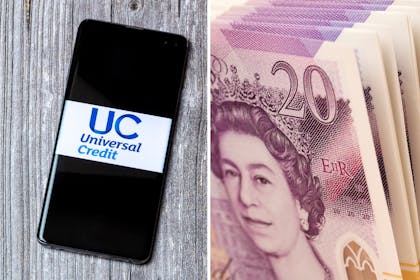8 ways people on Universal Credit can boost their payments

Did you know there are 8 ways people on Universal Credit can boost their payments? From advances to loans, here's what's available...
We're constantly looking for how to make money stretch that little bit further, as the cost of living crisis continues.
And while there are calls to increase Universal Credit – which could see households getting an extra £200 per month – this isn't yet confirmed.
But there are some extra payments that people claiming Universal Credit could be eligible for, to help out with emergency big payments or everyday essentials in the meantime.
- DWP confirms dates second £300 Cost of Living payment will be made
- October dates for DWP benefits
- DWP issues warning over delayed £300 CoL payment
- Will there be a cost of living payment in October?
- Boots £12 collagen serum that makes 'massive difference to skin'
Here are 8 ways to boost your payments:
1 Advance payments
If you are new to Universal Credit, you might be able to ask the DWP for an advanced payment on your cash.
Usually, when you start the benefit you have to wait 5 weeks for the first payment.
If you don't have enough money for essentials, however, the DWP can lend you the money, which can be paid back in instalments from future Universal Credit payments.
You might also be able to get an advance if a change in circumstances means you will be eligible for more money but the increased amount hasn't yet started.
2 Hardship Payments
If you break the rules of your benefit, such as missing an appointment with a work coach, you can be issued a sanction and risk having your benefits reduced or stopped.
But you can claim a Hardship Payment if this has happened to you.
To get the payment you have to show that you are unable to pay for basic essentials for yourself or for a child you are responsible for. This can include rent, heating and food.
You also have to prove you tried to get help from a charity first.
3 Housing payments
Struggling with the never-ending rent increases? You can apply for a Discretionary Housing Payment (DHP) which can help with housing costs.
This is available for people claiming Housing Benefit or the housing element of Universal Credit.
4 Budgeting advance
Sometimes there will be a big purchase we need to make and no way of making it. Whether that's a broken down fridge or costs associated with a new job – such as clothing or equipment.
The DWP can loan you the money through the budgeting advance that starts at £100.
You can then pay it back through your regular Universal Credit payments.
5 Funeral expenses payment
Universal Credit claimants can get a payment to help out with the funeral costs for a partner, close relative or close friend.
You can also claim this if your baby was stillborn after 24 weeks of pregnancy.
There is no fixed amount given for this benefit but the payment can cover burial or cremation fees, moving the body or transporting the coffin, a return journey for you to attend the funeral and up to £1,000 for related expenses including funeral director's fees, the coffin, flowers etc.
6 Legal costs
You might also be able to get help with legal costs including legal aid and prison visiting costs from the DWP.
7 Other benefits
If you're claiming Universal Credit, you may be able to sign on for other benefits too.
You might be eligible for Personal Independence Payment (PIP), for example, if you have a health condition or disability which means extra money coming in.
Check out the benefits calculators on the government website here to see what you're eligible for.
8 Cheap days out
Did you know families on Universal Credit can get discounted tickets to days out?
Although this isn't an extra payment, it is a good way families can save money.
You can read about the places which offer cheap tickets here.
Cost of Living Payment
If you're still in need of financial help, you might be eligible for the Government's currerntl Cost of Living payments.
This is a sum of £900 divided into 3 payments to help out households claiming certain benefits – and the next one is due in October.
For more targeted help for you, the DWP said: 'If you’re in financial difficulties, you can get help and advice from the Government, local councils and other organisations.'
Other support available
Many low-income households will be eligible for the Household Support Fund.
This is a pot of money the DWP allocated to local councils who spend it on their communities where they think most need it – for some areas, residents will be given cash to help out with essentials, and for others, they might receive vouchers for supermarkets.
Take a look at our guide for more information on what different councils are providing.
The DWP is also providing further Cost of Living payments, for example for those with a disability. You can read about them all here.
Take a look at our Cost of Living hub for more information and handy tips to help with budgeting, benefits and the cost of living.
There are also top tips from the Money Saving Expert, Martin Lewis, as well as brilliant ideas for saving money on everything from your weekly shop, to that well-deserved holiday.
Related stories
Thousands eligible for one-off £275 payment next month








